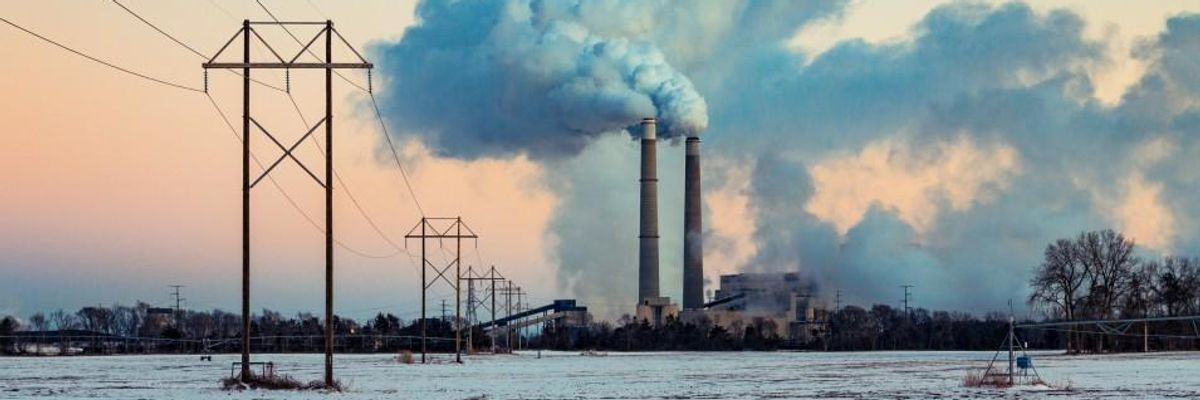Looking toward the United Nations summit scheduled for the end of the month, a top U.N. agency on Monday released a report that makes a "health argument for climate action" and calls on governments and policymakers to urgently tackle the emergency.
"Protecting people's health from climate change requires transformational action in every sector."
"The burning of fossil fuels is killing us," warns the World Health Organization (WHO) report, noting that the practice is "causing millions of premature deaths every year through air pollutants, costing the global economy billions of dollars annually, and fueling the climate crisis."
In the foreword, WHO Director-General Tedros Adhanom Ghebreyesus highlights that human-caused global heating is impacting droughts, extreme heat, floods, hurricanes, and wildfires.
"Climate change is the single biggest health threat facing humanity," says the report. "And while no one is safe from the health impacts of climate change, they are disproportionately felt by the most vulnerable and disadvantaged."
"Protecting people's health from climate change requires transformational action in every sector, including on energy, transport, nature, food systems, and finance," the report continues. "The public health benefits from implementing these ambitious climate actions far outweigh their costs."
Tedros, in a statement Monday, said that "the Covid-19 pandemic has shone a light on the intimate and delicate links between humans, animals, and our environment."
"The same unsustainable choices that are killing our planet are killing people."
"The same unsustainable choices that are killing our planet are killing people," the agency leader added, underscoring how important COP 26--the upcoming U.K.-hosted summit that will be held in Glasgow, Scotland--is to meet the goals of the 2015 Paris climate agreement.
"WHO calls on all countries to commit to decisive action at COP 26 to limit global warming to 1.5degC--not just because it's the right thing to do, but because it's in our own interests," he said. "WHO's new report highlights 10 priorities for safeguarding the health of people and the planet that sustains us."
Those priorities, explained at length in the report, are:
- Commit to a healthy recovery;
- Our health is not negotiable;
- Harness the health benefits of climate action;
- Build health resilience to climate risks;
- Create energy systems that protect and improve climate and health;
- Reimagine urban environments, transport, and mobility;
- Protect and restore nature as the foundation of our health;
- Promote healthy, sustainable, and resilient food systems;
- Finance a healthier, fairer, and greener future to save lives; and
- Listen to the health community and prescribe urgent climate action.
The report comes a few weeks after the WHO updated its guidelines on air quality for the first time in over 15 years, warning that "air pollution is now recognized as the single biggest environmental threat to human health" and the burden of disease attributable to it is "estimated to be on a par with other major global health risks such as unhealthy diet and tobacco smoking."
Pointing to the new standards--which reflect the impact of fossil fuels on humans--Dr. Maria Neira, WHO's director of environment, climate change, and health, said Monday that "it has never been clearer that the climate crisis is one of the most urgent health emergencies we all face."
"Bringing down air pollution to WHO guideline levels, for example, would reduce the total number of global deaths from air pollution by 80% while dramatically reducing the greenhouse gas emissions that fuel climate change," she said. "A shift to more nutritious, plant-based diets in line with WHO recommendations, as another example, could reduce global emissions significantly, ensure more resilient food systems, and avoid up to 5.1 million diet-related deaths a year by 2050."
Related Content
WHO's New Air Pollution Guidelines Reflect Deadly Toll of Fossil Fuels
Jessica Corbett
The new report was released alongside an open letter from 450 organizations representing over 45 million health workers, along with more than 3,400 individuals from 102 different countries.
"As health professionals and health workers, we recognize our ethical obligation to speak out about this rapidly growing crisis that could be far more catastrophic and enduring than the Covid-19 pandemic," the letter says of the climate emergency.
"We call on the leaders of every country and their representatives at COP 26 to avert the impending health catastrophe by limiting global warming to 1.5degC," the letter adds, "and to make human health and equity central to all climate change mitigation and adaptation actions."
The letter, which provides examples of how the climate emergency is already impacting human health and specific recommendations for moves that policymakers can pursue, concludes that "these climate actions must be taken now to protect the planet, and the health, well-being, and prosperity of all people alive today and for generations to come."





